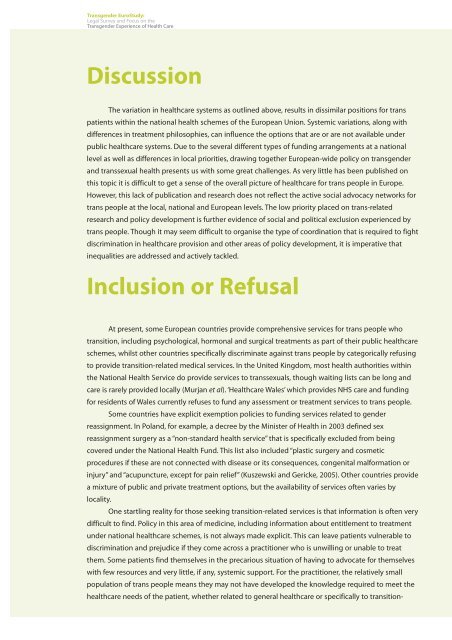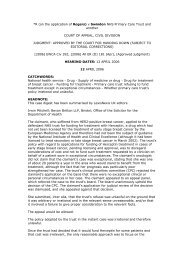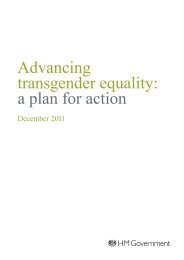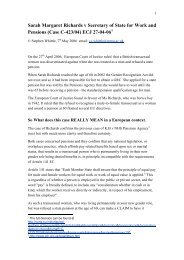Transgender EuroStudy â Legal Survey and Focus ... - ILGA Europe
Transgender EuroStudy â Legal Survey and Focus ... - ILGA Europe
Transgender EuroStudy â Legal Survey and Focus ... - ILGA Europe
Create successful ePaper yourself
Turn your PDF publications into a flip-book with our unique Google optimized e-Paper software.
<strong>Transgender</strong> <strong>EuroStudy</strong>:<br />
<strong>Legal</strong> <strong>Survey</strong> <strong>and</strong> <strong>Focus</strong> on the<br />
<strong>Transgender</strong> Experience of Health Care<br />
Discussion<br />
The variation in healthcare systems as outlined above, results in dissimilar positions for trans<br />
patients within the national health schemes of the <strong>Europe</strong>an Union. Systemic variations, along with<br />
differences in treatment philosophies, can influence the options that are or are not available under<br />
public healthcare systems. Due to the several different types of funding arrangements at a national<br />
level as well as differences in local priorities, drawing together <strong>Europe</strong>an-wide policy on transgender<br />
<strong>and</strong> transsexual health presents us with some great challenges. As very little has been published on<br />
this topic it is difficult to get a sense of the overall picture of healthcare for trans people in <strong>Europe</strong>.<br />
However, this lack of publication <strong>and</strong> research does not reflect the active social advocacy networks for<br />
trans people at the local, national <strong>and</strong> <strong>Europe</strong>an levels. The low priority placed on trans-related<br />
research <strong>and</strong> policy development is further evidence of social <strong>and</strong> political exclusion experienced by<br />
trans people. Though it may seem difficult to organise the type of coordination that is required to fight<br />
discrimination in healthcare provision <strong>and</strong> other areas of policy development, it is imperative that<br />
inequalities are addressed <strong>and</strong> actively tackled.<br />
Inclusion or Refusal<br />
At present, some <strong>Europe</strong>an countries provide comprehensive services for trans people who<br />
transition, including psychological, hormonal <strong>and</strong> surgical treatments as part of their public healthcare<br />
schemes, whilst other countries specifically discriminate against trans people by categorically refusing<br />
to provide transition-related medical services. In the United Kingdom, most health authorities within<br />
the National Health Service do provide services to transsexuals, though waiting lists can be long <strong>and</strong><br />
care is rarely provided locally (Murjan et al). ‘Healthcare Wales’ which provides NHS care <strong>and</strong> funding<br />
for residents of Wales currently refuses to fund any assessment or treatment services to trans people.<br />
Some countries have explicit exemption policies to funding services related to gender<br />
reassignment. In Pol<strong>and</strong>, for example, a decree by the Minister of Health in 2003 defined sex<br />
reassignment surgery as a “non-st<strong>and</strong>ard health service” that is specifically excluded from being<br />
covered under the National Health Fund. This list also included “plastic surgery <strong>and</strong> cosmetic<br />
procedures if these are not connected with disease or its consequences, congenital malformation or<br />
injury” <strong>and</strong> “acupuncture, except for pain relief” (Kuszewski <strong>and</strong> Gericke, 2005). Other countries provide<br />
a mixture of public <strong>and</strong> private treatment options, but the availability of services often varies by<br />
locality.<br />
One startling reality for those seeking transition-related services is that information is often very<br />
difficult to find. Policy in this area of medicine, including information about entitlement to treatment<br />
under national healthcare schemes, is not always made explicit. This can leave patients vulnerable to<br />
discrimination <strong>and</strong> prejudice if they come across a practitioner who is unwilling or unable to treat<br />
them. Some patients find themselves in the precarious situation of having to advocate for themselves<br />
with few resources <strong>and</strong> very little, if any, systemic support. For the practitioner, the relatively small<br />
population of trans people means they may not have developed the knowledge required to meet the<br />
healthcare needs of the patient, whether related to general healthcare or specifically to transition-








